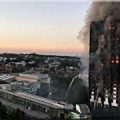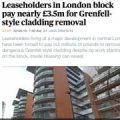 Labour shadow secretary for housing John Healey says it is ‘wrong’ that ordinary leaseholders are being dumped with huge bills to remove Grenfell Tower cladding from private blocks of flats.
Labour shadow secretary for housing John Healey says it is ‘wrong’ that ordinary leaseholders are being dumped with huge bills to remove Grenfell Tower cladding from private blocks of flats.
In a letter to Communities Secretary Sajid Javid (below) he writes:
“It is surely wrong that residents have to pay for these essential works. Rather the first call must be on the owner or manager of any tower block to co-ordinate these essential works, and on the developer or contractor who installed dangerous and non-compliant cladding to pay for the remedial work that now needs to be urgently done.”
Mr Healy criticises Mr Javid for not identifying all the private blocks of flats that have “dangerous aluminium composite material”.
“Not only do you still not know how many private blocks are at risk, you have provided no information about remediation work in private block. Of the private blocks you do know about, how many have had all the cladding removed? Of these, how many have started to install replacement cladding? And of these, how many have finished the installation of replacement cladding?”
LKP is unaware of any private site where Grenfell cladding has been removed.
Mr Healey adds:
“In MP correspondence you have said ‘I urge those in the private sector with responsibility for resident safety to follow the lead from the social sector and private companies already doing the right thing, and not attempt to pass costs on to leaseholders.’
“Given this is statement of government policy, what are you doing to enforce it? How many of those concerned [freeholders] have heeded your statement, and how many have not?
“What are you doing to stop block owners or managers pre-emptively going to the tribunal to force leaseholders to pay?
“There is much more that the government could be doing to ensure that work is done and costs are shared fairly.
“Where those with a responsibility for building safety in private blocks are not able to afford the cost of urgent work up-front, will you consider providing government loans to be paid to get this work done?”
Of course, government loans to remove the cladding does not escape from the fact that ordinary leaseholders face huge bills to remove cladding put up by long-gone developers that was approved by by safety regulations at the time and is now deemed unsafe.
Some leaseholders at Citiscape in Croydon only bought their flats earlier last year, yet face bills of £20,000.
Their freeholder (Proxima GR Limited) is ultimately the Tchenguiz Family Trust based in the British Virgin Islands.
At Heysmoor Heights in Liverpool, where leaseholders face bills of £18,000 the freeholder is Abacus Land 4 Limited, a Guernsey company administered by Will Astor’s £1.7 billion Long Harbour fund.
Its spokesman, Adrian Flook, a former Tory MP employed by Sir Lynton Crosby’s PR company Crosby Textor, tells LKP:
“Mr Astor has no beneficial interest in Abacus Land 4 Ltd as these are companies wholly owned by UK pension and life funds.”
Citiscape:
Heysmoor Heights:
The full letter is here: 180118 Letter to Sajid Javid on private blocks fire safety (1)




 CRL insurers to explain ground rents set to zero
CRL insurers to explain ground rents set to zero






















What a truly depressing spectacle.
Whether it is the Secretary of State or now the Opposition spokesman, the indignation of MPs as to what “should” happen surely adds insult to injury.
Is ‘wrong’ even a legal definition?
What these comments seems to show is that Parliament created a scandal that it did not understand? And still seemingly struggles to believe could be true. Yet it is.
Perhaps it is because MPs are whipped ‘lobby fodder’ most of the time and probably never read the detail in the Bills they vote through, and Bills are anyway rarely given enough time for proper scrutiny, but this is a serious disaster of huge financial consequences for ‘ordinary’ leaseholders and MPs on all sides seem to only now be waking up to the scandal of leasehold law thatthey voted for more than once.
Being ‘wrong’ is not the same as being illegal. “Abandon hope all who enter here”, etc.
MPs can posture all they like, but leasehold and contract law is jealously guarded by courts, and courts exclusively have had leaseholders tightly held by their soft bits for years due to the abject failure of legislators to create fair law.
So now that leaseholders are in a right mess and will likely carry the can as ever, politicians are appealing to moral arguments for want of legal ones?
Is all this unsafe cladding a ‘defect’ that a contractor somewhere in the lucrative leasehold food chain can now be pursued to remedy? Or a failure of ‘expert’ inspection? Or of government deregulation and failure to ensure fire standards were upheld?
How would holding the ‘manager’ to account help RMCs or RTM companies made up of leaseholders?
They had no say in what cladding was added to the building when built, or had no idea if they agreed to the cladding later that it was being added in a poorly regulated period of fire safety.
It sounds good to blame ‘management’ but it is outrageous in practice in this context.
Once upon a time blocks were built of brick or stone. Ugly and cold and damp, maybe, but not a fire death trap. Along came deregulation and self-inspection and even ‘desktop’ theological safety assessments, and the result is a fire safety scandal.
If the contractors did not fit defective cladding per standards applied at the time, whose fault is that? It is surely the government’s job to create and maintain a fire safe legal environment. Why is nobody being crystal clear whether the cladding failed existing standards and therefore somebody in the ‘expert’ food chain is liable?
Alternatively, if the standards were at fault, why does the government not carry the can for being asleep at the wheel?
The ‘ordinary’ leaseholder was surely entitled to trust that government kept building regulation and practices on safe track and would never let residential buildings be clad in highly flammable materials.?
Should ‘ordinary’ leaseholders have to sue the government for apparently being such incompetent eeejits? Who could afford that?
Meanwhile, why should freeholders even bother to fret over blame or contract defects and just turn to the usually one-sided lease? Is removal of perfectly working -just inflammable – cladding a ‘repair’ or an ‘improvement’? Do the government lawyers know the answer? If they do, why not state so and volunteer to assist leaseholders at the Lands Tribunal, where no doubt highly paid barristers will act for freeholders – an unfair redress process that government set up?
While we’re at it, where are all the free law centres that the ‘ordinary’ leaseholder once might have attended for advice?
The whole point of leasehold law is to put the ‘ordinary’ leaseholder at the end of a lucrative feeding trough and the only person to pay all costs. All costs.
It will be interesting to see if the courts take any account in the various cases coming up, from Parthenia on, to the recent moral angst emanating from politicians, or simply apply the current law?
‘Ordinary’ justice, fairness or ‘wrong’ have nothing to do with law. We rely on politicians for that.
Sorry for trying to be logical and not blame all on leasehold law. Let’s assume for a moment that we had no leasehold on this country and all blocks were commonhold. Who would pay for removal of cladding ? There would be no Freeholder to blame. This is clearly not a leasehold problem and the cladding issue has been caused by local authorities and building regulations allowing such materials. If anyone needs to pick up the costs it would be the local authority who signed off such developments. It’s very easy to lose sight of the facts but this is not a leasehold issue , as if we had Commonhold the flat owners would also be facing the same repair costs.
STRICT REGULATION FOR MANAGING AGENTS and THE ABOLITION OF LEASEHOLD is the only way forward.
Interested, But if it were to be commonhold and assuming that the flat owners were responsible for the repair costs at least their would not be a “profit motive”attaching to those costs?
The leaseholders are free to nominate contractors to give estimates. under section 20 regulations. This would ensure competitive pricing.
Interested, Come on, you know better than that? The freeholder would simply apply to the FTT to suspend the need for a Section 20 notice due to the urgency of the works.. In the meantime it has been claimed that cladding contractors are doubling their normal prices at present. Nor should it be forgotten that Firstport have a vested interest in increasing the cost of replacement as much as possible.
In his statement Keith Shields uses the phrase “In the absence of alternative funding”
Does this not suggest that unless leaseholders pay up the replacement works cannot be undertaken as Firstport do not have sufficient funds(or access to funding)
Did anyone else notice the emphasis given in his statement to Firstport as managing agent rather than to Firstport as landlord? Why was that I wonder?
that is hilarious!
Master Epstein, What if the freeholder has created an inflated ( admitted by the surveyor) 3 +Year reserve fund that has not taken into account the liabilities that fall to the lessee or the scope of works reasonably Necessary? Let’s say that they have increased the service charge by approx 400% pa to include the inflated “ Major Works” fund. to run for 3 +yrs. That is a chunk of cash!
Even if the freeholder is forced to adhere to the s20 legislation by a savvy leaseholder who hold their feet to the fire but the agent still chooses to go ahead with an associated company and their chosen surveyor to supposedly oversee the works ( for a fee of course) but who is more familiar with commercial properties in let’s say the Midlands rather than Residential properties in London. Let’s say that the Agent has connections with the Midlands. Should we be worried?
Is it possible for agents to take money from the service charge “ reserve Major Works “ trust “ fund without the permission of leaseholders.? EG for “ arrears” of a Leaseholder.
In short. Is the “Major Works reserve fund” sacred?
We did our Works last year and 3 of five residents put forward at least one estimate. The agency wanted to pick a builder estimate it chose. It was much more money than other ones. We had to fight to use one of ours. Agency’s only look to make money . A lot of them use mates or set up a co do bad work and go under and and change their name.So many friends have had this problem it is so stressful and not fair. I have signed the petition to regulate agents. It has to happen.
It’s a bit off topic but I noticed S20 was mentioned. I need advice please. I am very familiar with the s20 procedure up u TIL all the estimates have been submitted, although if the property is shared Freehold who ultimately decides Which estimate is appropriate. Are the directors of the company obliged to call a meeting to discuss the estimates and then the equal shareholders vote on which estimate they believe is appropriate giving their reasons why and declaring if they have any interest in the company either financial or familial. Is that also the case when choosing a surveyor to project manage the works. I would really appreciate any advice.
Under section 20 a managing agent has to take leaseholders nominations of contractors into consideration, unless the managing agent has obtained a minimum of three quotes and has opted for the cheapest. In the Peverel/Firstport price fixing scandal, they arranged for two stooge companies to give higher tender prices than Cirrus(now known as Appello) who then “won” the work. Of course Cirrus/Appello were and still are part of the Firstport group of companies.
There have also been recorded cases of contractors bidding against each other (which it is how it supposed to be) only to be found out later that they were not separate companies but in reality different trading names of the same company!
On a personal note (I never normally refer to my development) a decorating project was delayed due to “aggressive conduct of certain individuals” according to Firstport . What they still have failed to answer is as to how it could have come about the winning tender document had no name and address of the contractor on the tender document, nor any explanation as to how it came to be that subsequent versions of the tender document had differing names of the contractor scrawled in biro added? After being challenged, the surveyor appointed to manage the decorating project pulled out and the property manager suddenly left the employ of Firstport.
Wow! The dirty tactics Peverel / First Port employed to exploit leaseholders is almost beyond comprehension.
Michael would you mind if made a copy of your posting with a view to perhaps using it in a Court Hearing? It could prove most useful.
Sorry, but you misunderstand my point if replying to me.
Yes, government deregulation and failure to update fire regs and inspections seems to blame for all the unsafe cladding that was added to hitherto non flammable walls. But the problem is much worse for leaseholders than any tenants in such afflicted blocks.
There is enough logic to go around. Shame nobody who claimed to be expert saw this logic at the time?
Those who profit very well from building and selling leasehold and charging fees just to have a new carpet have absolutely no financial obligation. That is the scandal.
Anyone who has ever negotiated knows the difference between being merely informed, merely consulted, or having the right of choice and veto. What choice or veto do leaseholders have? Shouting “Wrong” after the fact doesn’t pay the bill.
Long leasehold is deliberately designed to ensure that ‘landlords’ decide what they want to do and when without interference from those who pay all the costs, and while they’re at it, they have no reliable obligation to account back for their actions or spending to those who pay all the costs.
The logic I would suggest is in steps:
1. The long leasehold tenure scandal should have been corrected years before any government deregulated fire standards etc. Developers would then have sold blocks as commonhold to be owned outright by the leaseholders who collectively made all decisions.
2. Developers of blocks should have been held legally liable for any defects OR deficiencies later found in safety standards and required to indemnify owners and their successors in title via an ongoing collective Building Indemnity Scheme or some such. That would focus the minds of so-called experts. Not have blocks thrown up and sold on, or converted around the owners, into what turns out to be fire traps, leaving it to the hapless leaseholders to pay for the consequences.
3. Any work done to residential buildings that is found later to be a fire hazard would likewise have been unambiguously regulated to hold those who should have known what they were doing accountable for the cost of remedy. Same as Company Law expects directors to know what they are doing when running a company. There is no similar ‘Governing’ Law? Any eejit it seems can enter Parliament.
4. With real protections in place (effectively that a residential block must be fit for purpose – dramatic concept that?) nobody but the commonholders themselves acting together would decide what was changed to their homes and common parts, and yes, if they acted recklessly they would be in hock to sort it out.
Current leasehold law treats long leaseholders worse than tenants – compliant sheep who must pay up and know their place.
Methinks that “interested says” is Stephen, or someone like Stephen, trying every angle to defend our obscene leasehold laws.
Oooh welcome back David I have been missing your erudite and sometimes acerbic comments. Belated happy New Year 2018 comrade.
Messsrs Epstein , McArthur and Paddy.. I do hope Interested expands on his/ her argument so we can all have a healthy debate.
I think it only fair for interested to divulge any interest in Freehold / property management affairs. It is of course entirely up to them whether they do so., although it would be be ethical.mfor them to clarify any interest in the “ business”.
Kim, If LKP gives you permission you certainly have mine!
Thank you Michael .Your posting has brought some real clarity to an issue…
That has given me food for thought. I will talk to my neighbours. I think is what might happen.